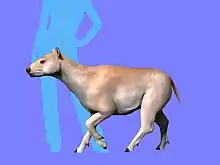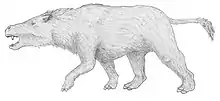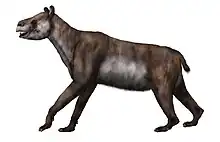Liarthrus
Liarthrus ("smooth joint")[1] is a genus of astrapotherid mammal known from the Late Oligocene (Deseadan SALMA, around 29-21 mya) Sarmiento Formation of Santa Cruz Province, Argentina.[2][1] It was described by the Argentine paleontologist Florentino Ameghino in 1895 along with several other genera from the "Pyrotherium Beds", which were then believed to date to the Cretaceous period.[3] Ameghino described Liarthus on the basis of fragmentary, being only a right astragalus (tarsal bone), premolar 4, and an incomplete premolar from the upper jaws.[4][2] Only one species was described, L. copei, the species name honoring the American paleontologist Edward Drinker Cope, who lived during the same interval as Ameghino. Liarthrus was synonymized with the other astrapothere Parastrapotherium in 1914 by American mammologist Frederic Loomis,[5] though it was revalidated by a 2008 analysis of Parastrapotherium.[2] Liarthrus was a herbivorous mammal, being an astrapothere, which had large tusks on their skulls and mandibles in addition to a large body size.[6]
| Liarthrus | |
|---|---|
| Scientific classification | |
| Domain: | Eukaryota |
| Kingdom: | Animalia |
| Phylum: | Chordata |
| Class: | Mammalia |
| Order: | †Astrapotheria |
| Family: | †Astrapotheriidae |
| Genus: | †Liarthrus Ameghino, 1895 |
| Type species | |
| Liarthrus copei Ameghino, 1895 | |
References
- Palmer, T. S. (1904). Index generum mammalium: a list of the genera and families of mammals (No. 23). US Government Printing Office.
- Kramarz, A. G., & Bond, M. (2008). Revisión de Parastrapotherium (Mammalia, Astrapotheria) y otros astrapoterios Deseadenses de Patagonia. Ameghiniana, 45(3), 537-551.
- Ameghino, F. (1910). Geologia, paleogeografia, paleontologia, antropologia de la reública Argentina. la Nación.
- Ameghino, F. (1895). Première contribution à la connaissance de la faune mammalogique des couches à Pyrotherium. PE Coni.
- Loomis, F. B. (1914). The Deseado Formation of Patagonia. Rumford Press.
- Cerdeño, E., & Vera, B. (2017). New anatomical data on Pyrotherium (Pyrotheriidae) from the late Oligocene of Mendoza, Argentina. Ameghiniana, 54(3), 290-306.

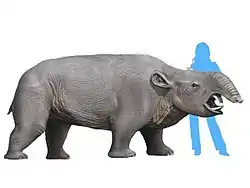
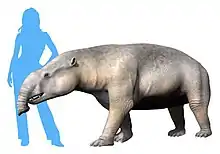
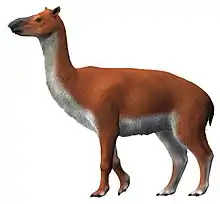
.jpg.webp)
